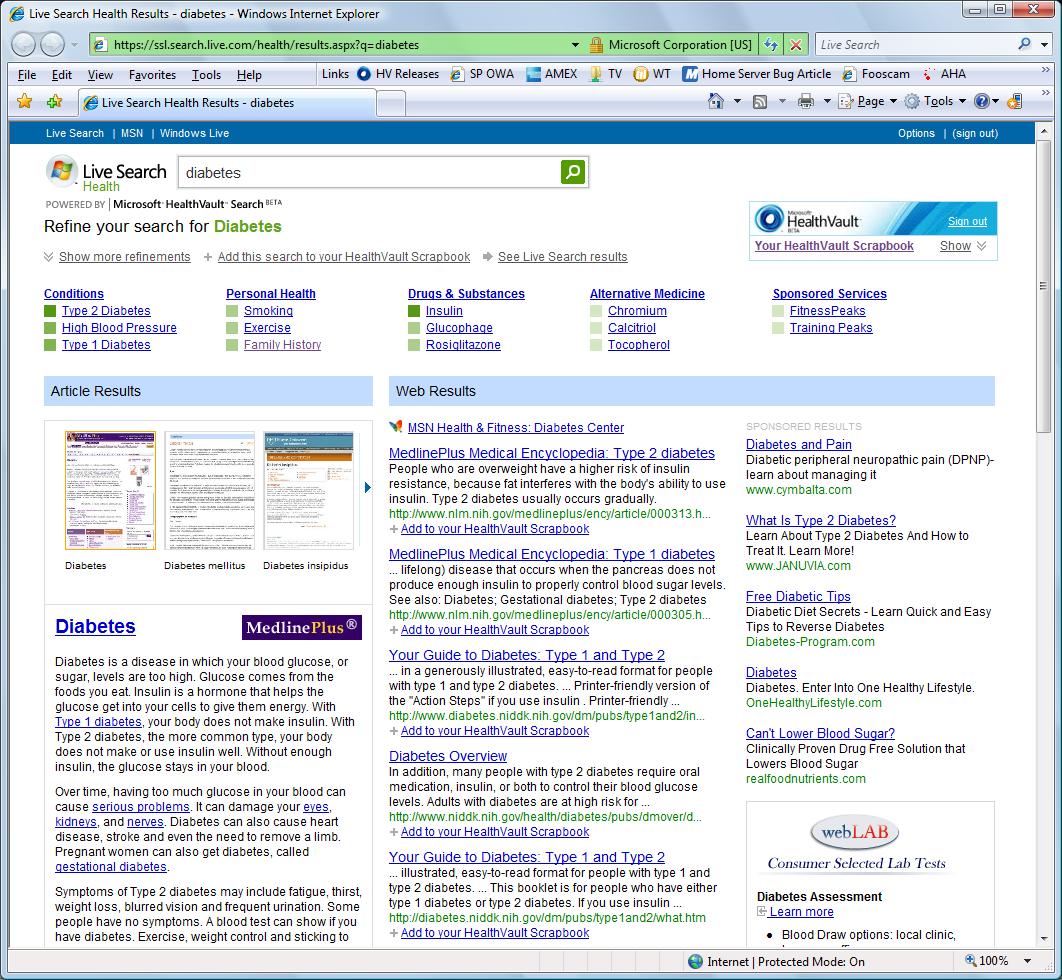Get Educated!
 I realized the other day that I haven't ever focused much on our search application here. But Live Search Health is a super-important part of the HealthVault ecosystem -- and something we've spent a bunch of time working on.
I realized the other day that I haven't ever focused much on our search application here. But Live Search Health is a super-important part of the HealthVault ecosystem -- and something we've spent a bunch of time working on.
It's inescapable that pretty much everything online starts with search today. The same goes for health -- but when we started thinking about the problem a couple of years ago, the results for health searches really didn't deliver. We saw two things happening, neither optimal.
On the Google side, you got all the great breadth of content that the web offers. And this is key stuff, because the best health information is super-personalized ... not just how to live with lupus, but how to live with lupus when you like to ride horses and eat out a lot. But people felt overwhelmed. What to trust? How to get started? These are complicated topics that need some context.
WebMD is the flip side of this picture. They provide great context -- their "walled garden" of content keeps the chaos at bay, and the information is clearly attributed and vetted. But when we talked to people -- they were left wanting more. Once they felt grounded in topics, the walled garden simply didn't provide the breadth to get to that super-personalized content.
We specifically designed Live Search Health to deliver the best of both of these approaches. First, we help give people the context they need. The technology we acquired from Medstory automatically creates a "dashboard" of concepts related to a search. The dashboard allows people to quickly refine their query, but we also found that it had an even more powerful effect. Just seeing the landscape of related concepts help people feel more grounded and gave them a sense of "place" to get started.
Armed with that landscape, we deliver a small set of key "overview" articles right on the results page. These articles serve a very specific purpose: get you educated about the basics of your search topic, without having to click away from your results. We've chosen content providers from a number of different perspectives, ranging from the Mayo Clinic, to the National Library of Medicine, to alternative medicine experts like NCCAM and community-oriented sources like Wikipedia -- so users can pick the sources they're comfortable with.
Next on the path is web results -- the full breadth of the web, with all of that personalized content. The Medstory technology helps suppress commercial spam from the results, but we're not censors here. We believe that by the time the user gets to web results at Live Search Health, they're ready to dig in.
Finally, we realized that health searchers don't just need to learn about their conditions -- they need to do something about them. So we're working really hard to build connections to relevant HealthVault applications and services. This is where we really change the game -- helping people learn, and then giving them tools and options to take real action.
There's all kinds of other things to talk about with Live Search Health -- our great privacy policies that make it safe to search about the most sensitive topics without worrying about who's watching over your shoulder, and the HealthVault Scrapbook that lets you securely store and share the results of research. But I'll leave those for another post because it's late and I'm running out of steam.
Next time, I'll talk a bit about the fun search widget I just put together -- you can see it running on the right side of my blog where it says "get educated about..." -- I'll describe how you can easily add the widget to your own blog or sites, and help your users learn more about the topics that matter to them.
As always, thanks for reading ... there's just so much great stuff to talk about.